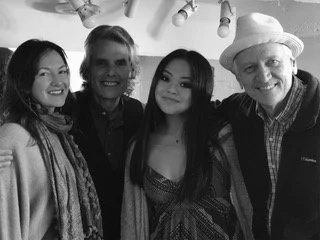Bluegrass for Better 501(c)(3)
Bluegrass For Better is a 501(c)(3) nonprofit organization that aims to support and raise awareness about adoption through bluegrass music.
"I was adopted from Fengcheng, China when I was 9 months old. I had never really thought much about this part of my life, mainly because I do not remember it. However, as I grow older, I realize my adoption is an important part of my history and deserves to be recognized. I am beyond grateful for my life here in San Francisco and wish to give back to orphanages that have helped me and so many others obtain the opportunity for a fulfilling and stable life.” - Helen Ludé
December 2019 - My Adoption Story
Peering through a window at the Fengcheng airport in China, idly observing workers loading luggage, I ponder the path that had propelled my search. Yet, I remain perplexed.
I will never know who, among the billions of people on this planet, gave me my existence, my black hair and dark eyes, my feisty personality, my musical interest, and my annoying allergy to cats. The origins of these traits will always be a mystery to me. I was adopted from Fengcheng when I was nine months old and have lived a quintessentially American childhood; I grew up in an urban, interracial French family, played competitive soccer, enjoyed diverse cuisines, and attended bluegrass American roots music festivals. As a child, I felt adoptee’s shame when I heard cultural jokes and questions regarding my genetic incompatibility with my parents. Discussing, or even thinking about my adoption, became a source of anxiety that I avoided in all forms.
Years later, as I studied China’s One Child Policy in school and on my own, my anxiety slowly transformed into curiosity. If things had gone differently, I might still be an orphan in rural China, my musical talent undiscovered or redirected, my taste for bluegrass undeveloped. I wondered, was it through genes, culture, or chance that I had become the passionate bluegrass fiddler I am today?
Once I understood how lucky I was to have been adopted, I wanted to help others have the same chance for a better life that was given to me. I founded Bluegrass for Better, a nonprofit that raises funds for Chinese orphanages and spreads adoption awareness through bluegrass music. From hosting benefit concerts to teaching music and more, working for this cause helped me to feel more at peace with my past. I had transformed my adoption into a source of motivation.
Still, something essential was missing. I remained unsure of my identity. I felt an inchoate urge to return to my birthplace in hopes I would discover who I really was. I sought some talisman to dispel this lingering uncertainty. As I arranged a trip to Fengcheng, I was unsure of what exactly I would find. I only knew that I was in search of my true self. Then, after seven months of planning, I met social workers who had saved me and placed me. I visited the street corner where I was found, which I had only seen in a tattered photo. Fluent in Mandarin after years of classes, I translated original copies of my monthly development reports. I was a baby who ate “abundantly,” slept “well,” and—appropriately enough—was “comforted by music.” It was difficult to comprehend the fact that she had been me and that I was still she.
The boarding call momentarily interrupts my reverie. Once seated, my thoughts return to the question that drove me on my journey. As I watch my birthplace vanish beneath the clouds, I am initially shaken by my lack of emotion. Then I understand that my experience in Fengcheng didn’t tell me who I am, but instead showed me who I could become. Seeing and handling the artifacts of my infancy helped me understand that my identity is not determined by my past. Rather, it is something I have the power to actively shape through my decisions in the present. My musical capabilities may be due to my genes, and my taste for bluegrass music due to the culture I grew up with, but I form my identity as a bluegrass musician by choosing to nurture these aspects of myself.
So, who am I? I am a girl who is genetically Chinese and culturally American. But more importantly, I am a girl who chose to explore her origins, who reconciled her ethnic and cultural identities through art and service to others, and who will continue to purposefully explore and create her unique identity at university and beyond.





